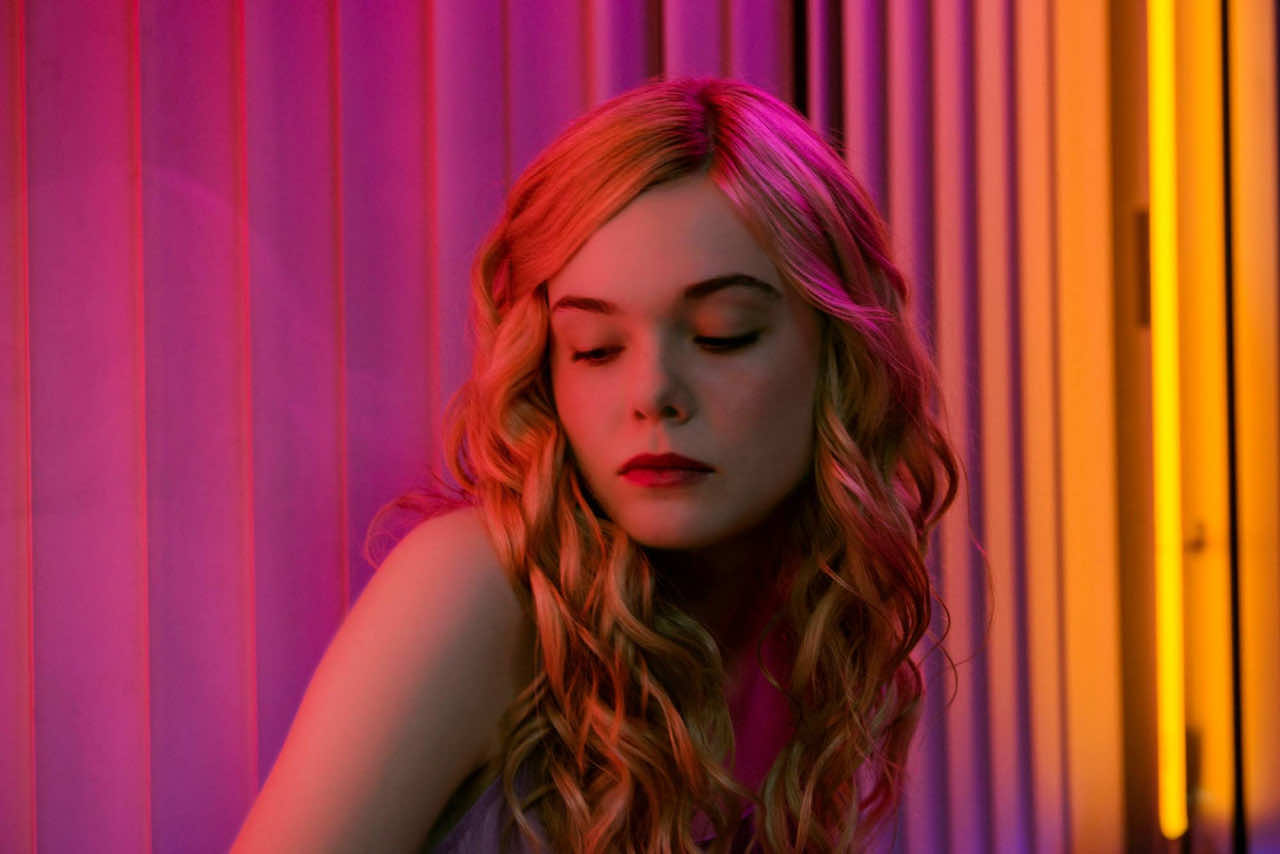The manner in which the majority of media audiences value, perceive and consume beauty is something so deeply ingrained in our society, it’s hard to believe we will ever see it change. From Donald Trump’s own admission that he would date his daughter to the slew of beauty articles written in admiration of Michelle Obama’s triceps, our Western Capitalist society loves to latch on to the ideal of beauty. Even in the face of the refrain of love oneself above all, there is always something better to take in or strive for to make one’s love for thyself relevant. It’s a cycle of hypocrisy that we’ve surrounded ourselves with in our modern times. For all the complaints of rail thin models and reaches to make “full figured” women an object of beauty, there are 90 times more ways to make that noble reach the exception.
It’s a modern concern befitting the modern interests of a director like Nicolas Winding Refn. I spent a lot of space tearing down his reach for classical psychological concerns in Only God Forgives. His heavy-handed modern pretension cheapened primal themes like the Oedipal complex (Film Review: ‘Only God Forgives’ is a problematic, distancing art film).  Somehow, however, that cheap baseness works when confronting issues that feel more contemporary and less abstract: our society’s hypocrisy about aspirations for and admiration of beauty. As one fashion designer says in Refn’s latest film, The Neon Demon: “Beauty isn’t everything. It’s the only thing.” From apps like Tinder to aspirations for fame on Instagram, it’s a harsh truth that penetrates everything in our zeitgeist that asks for judgement upon first glance. It’s also nothing new, but that’s because it’s so humanly instinctive.
Somehow, however, that cheap baseness works when confronting issues that feel more contemporary and less abstract: our society’s hypocrisy about aspirations for and admiration of beauty. As one fashion designer says in Refn’s latest film, The Neon Demon: “Beauty isn’t everything. It’s the only thing.” From apps like Tinder to aspirations for fame on Instagram, it’s a harsh truth that penetrates everything in our zeitgeist that asks for judgement upon first glance. It’s also nothing new, but that’s because it’s so humanly instinctive.
The latest incarnation of that allure is Jesse (Elle Fanning). In Los Angeles, a place where parents don’t exist and virgin youth is coveted above all, she is promised a career of greatness by a modeling agent (Christina Hendricks). Other models are tossed to the scrap heap of “you can go” and “you’re fired” to make way for Jesse’s natural, 16-year-old beauty (but always tell them you’re 19). In the face of threatening men — from naïve (a fawning, idealistic wannabe boyfriend played by Karl Glusman) to sinister (a steely photographer who embodies objectification played by Desmond Harrington) — makeup artist Ruby (Jena Malone) seduces Jesse under her wing. The sleepy-eyed Malone gives Ruby a reserved yet lustful quality that a bumpkin like Jesse, however, seems oblivious to.
Ruby soon introduces her to a pair of more seasoned — and salty — models, the doll faced duo of Gigi (Bella Heathcote) and Sarah (Abbey Lee). During a casual meeting at a diner, the women dole out flattery mixed with the bitterness of resentment. As Sarah says, “Who wants sour milk when you can have fresh meat.” Little does Jesse understand, she is being tenderized for a fate more intimate than any man could ever dole out: the now aging models (somewhere in their early 20s) have a nefarious plan to make Jesse’s beauty their own that will most likely tear the rug from under unsuspecting filmgoers’ feet.
Refn’s flashy style, filled with the cold nebulous neon lighting of purple and red, brazenly lensed by Natasha Braier, is the perfect vessel to present the depraved world that quite literally chews Jesse up and spits her out. Once again, Refn’s go-to composer Cliff Martinez has delivered the right score for Refn. Beyond its new wave pulsing beats, there is a delicate shimmering effect of crystals melodically pulverizing delicately over gloomy synth melodies. The darkness and brilliance mix like the full moon shining on the blossoming but doomed affection between Jesse and her aspiring boyfriend Dean, as they exchange polite flirtations in the grimy, creepy parking lot of Jesse’s cheap motel (run by a perfectly cast Keanu Reeves, chewing up the sinister backdrop in what may be his greatest performance).
Nowhere is really safe for Jesse. She must embrace the strong, confident, independent woman inside and love herself to transcend it all. It’s what we are all told to do. Ironically, in the world of The Neon Demon it also makes her a less sympathetic character. As she pushes away the sincere intentions of Dean, she becomes ripe for the picking. During the film’s final act, Refn, who co-wrote the script with Mary Laws and Polly Stenham, tears down this seemingly heroic act as quickly as he builds it up. This deflation of sympathy is a double-edged sword. It speaks to the vapid distance in the cold void erected by Jesse’s self-actualization as a superficial being, but it also creates a drag on the film’s tension, even in the face of life and death stakes.
The film’s sometimes laughable dialogue doesn’t seem to help, be it serendipitous or by design. But maybe stupid talk in a world that panders to the stupid cycle of the superficial hypocrisy of what is beautiful should be as confrontational as this film is. It deserves a movie like this. The Neon Demon is sure to let a lot of people down, as it should. After all, beauty is only skin deep, and it often covers something dark and primal within the spectator that’s always starving to be fed.
The Neon Demon runs 117 minutes and is rated R (trigger warnings: things lurk in the shadows, necrophilia, blood showers and an eyeball makes an appearance from someplace it shouldn’t). It opens in our South Florida area this Friday, June 24 at a few select multiplexes. For screenings in other areas, visit the film’s official website and jump through the “buy tickets” link.












